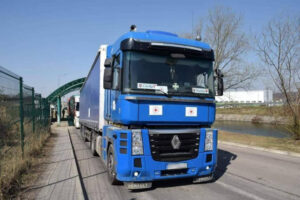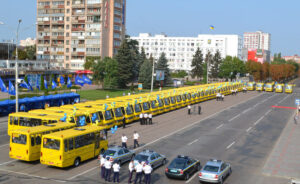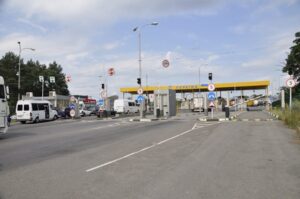
The exit of trucks from Ukraine to Poland through the “Shehyni” border checkpoint is currently blocked, the State Border Guard Service of Ukraine said in its Telegram channel on Wednesday.
“In front of the checkpoint “Medika” Polish farmers blocked the movement of trucks traveling from Ukraine to Poland. Passage of cars, buses, as well as trucks to enter Ukraine is carried out as usual,” the statement said.
The Border Guard Service promised to report on the resumption of crossing operations, but in the meantime called on truckers to choose other ways to Poland.

Cherkasskiy Avtobus” JSC, producing small class buses Ataman and trucks on the bases of Japanese Isuzu, plans to increase monthly production of buses on 25 %, till 50 pieces, trucks – on one third, till 40 pieces.
“Now “Cherkassy Bus” produces 40 buses and 30 trucks per month, and from July plans to increase production volumes to 50 buses and 40 trucks,” MP Dmitry Kisilevsky told the Interfax-Ukraine news agency.
In this connection he highlighted the importance for the company of the project on the production of 30 Isuzu trucks with flatbed and crane-manipulator Tadano, which is being implemented in Ukraine and handed over to the State Emergency Service.
Localization of production of the transferred vehicles is about 30%. State Emergency Service of Ukraine will use the vehicles, in particular for demining and clearing the territories affected by the Russian invasion and shelling.
As reported, the project is financed by the Japan International Cooperation Agency JICA, the first six vehicles have already been transferred to the SES.
“Cherkassy Bus” plant plans to hand over another 24 trucks in August-September this year. But JICA plans to participate in further deliveries of vehicles (buses and special trucks). The Ukrainian party is interested in producing these vehicles at Ukrainian enterprises as well,” Kisilevsky told the agency.
According to the Facebook page of the Federation of Employers of Ukraine, the ceremony of handing over Isuzu trucks to the State Emergency Situations Service was attended by Chief of the Isuzu-Ataman Ukraine business, Oleksandr Dorosh, Deputy Economy Minister Ihor Fomenko, Chairman of the State Emergency Situations Service Serhiy Kruk and Japanese Ambassador to Ukraine Matsuda Kuninori who, in particular, noted that Japan may cooperate with Ukraine in manufacturing heavy machinery or special vehicles for transporting people.
Founded in 1994, the Cherkassy Bus plant produces small class buses, as well as other wheeled vehicles based on Isuzu units.
As previously reported, the plant plans to invest 200 mln hryvnia in the production of a larger class of buses.
In 2022, the plant increased its net profit nearly 2.9 times to UAH 65.02 mln, with net income growth by 32.5% to UAH 842.29 mln.

From June 27, only trucks weighing more than 7.5 tons and scheduled buses will pass through the Yagodin-Dorogusk checkpoint to reduce queues at the border, the State Border Service of Ukraine reports.
“Cargoes up to 7.5 tons and light vehicles will not be processed. Empty trucks will move in separate traffic lanes, while fuel trucks will continue to be processed in the first place,” the message on Facebook said.

On the Zhytomyr highway on the M-06 Kyiv-Chop highway, traffic was partially opened for trucks on Saturday, the right passage of the destroyed bridge will be restored at the next stage, Minister of Infrastructure Oleksandr Kubrakov said.
“The movement of trucks on the Zhytomyr highway is open. Today we opened the left lane on the international road M-06 Kyiv – Chop near Parking and resumed traffic on the highway for trucks,” Kubrakov wrote on Facebook.
He noted that with the opening of the bridge on the M-06 highway, traffic will be resumed in almost all the main strategic directions of Ukraine and promised that the next step would be the restoration of the right passage of the destroyed bridge.
“We plan to complete the work in the fall,” the minister stressed.
According to him, it took less than two months to build a temporary passage for transport on the site of those destroyed as a result of hostilities.
“It took less than two months to build a temporary span structure on the remains of old structures, arrange a monolithic slab of the span structure and lay a layer of asphalt concrete. The road markings have been updated and appropriate road signs have been installed,” he said.
He stressed that thanks to the blown up bridge on the road to Irpin in the first days of the Russian invasion, the occupiers could not move further and surround the capital.
Kubrakov also reports that immediately after the liberation of the capital region, the construction of temporary crossings and detours began.
“A temporary bridge near Stoyanka was erected in mid-April, but only light vehicles could move through it – trucks were forced to take a detour, wasting extra time and fuel,” he added.

The Ministry of Infrastructure of Ukraine and the Ministry of Infrastructure and Development of Poland have agreed to cancel permits for all carriers engaged in international transportation of fuel, the press service of the Ministry of Infrastructure reported on Friday.
“Russian missile strikes on refineries and oil depots have created a critical situation in the fuel market. The goal of the team of the Ministry of Infrastructure in these conditions is the complete liberalization of international freight traffic to solve this problem. The new rules have already entered into force, and both Ukrainian and and Polish carriers. I am grateful to the Polish side for the constructive work,” Minister of Infrastructure Alexander Kubrakov is quoted as saying.
According to him, work will continue on simplifying cargo transportation and creating the most simple and understandable rules for carriers of goods necessary for Ukraine.
To enter the territory of Poland without a permit, fuel carriers must register by filling out the form: https://forms.gle/waid3FnRX1duve9z8
You must fill out the form no later than one day before crossing the border.
As reported, in April, Ukraine and Poland also agreed to increase the volume of rail transportation of Ukrainian exports to the EU and to world markets through Europe. In particular, the parties will set up a joint logistics venture in the near future.

The sales of new trucks weighing over 3.5 tonnes in January-July this year increased by 72.6% compared to the same period in 2020, to 2,746 units, according to AUTO-Consulting.
According to information on its website, 521 trucks were sold in July, which is 30.9% more than in the same month last year.
“Road construction continues to be the market driver. Dump trucks are bought like “hotcakes,” and it was the supply of equipment for road workers in July that changed the balance of power in the market,” analysts say.
Leadership in July 2021, as in the previous year, was retained by Belarusian-based MAZ with a market share of 15% and the sale of 78 vehicles (five more than in July 2020).
German-based MAN, which came in second with a margin of three vehicles, became the leader in the heavy-duty truck segment at the same time.
Scania maintained its third position, adding 30% in sales, to 70 vehicles and taking 13.4% of the market, and in the heavy segment it ranked second.
“In July, these three manufacturers managed to break away from competitors in terms of supplies and each sold more than 70 units of equipment,” the experts state.
The fourth was Ford Trucks with 55 vehicles sold and an increase of 72%, and Volvo ranked fifth in July (compared to the ninth place a year earlier) with the largest growth of 2.7 times, to 38 units.
A year earlier, the third and fourth lines of the July rating were occupied by Renault and Mercedes-Benz (in July this year – the eighth and sixth lines of the rating, respectively).